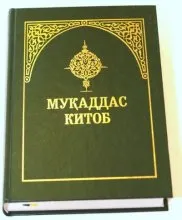
“Uzbek Christian believers looked forward greatly to getting the full Bible. The attitude to the Bible varies among traditional Muslims, but the main thing that all of our readers noted, regardless of their religion, was that the translated text is very clear. One Uzbek scholar, who is a university professor and a traditional Muslim, even said, ‘This is one of the best translated books I’ve ever read in Uzbek.’ It was a great joy for us to hear this from a professional of such caliber, because among Christian Uzbeks there are those who prefer the old (1992) IBT translation of the New Testament, which was based on the Russian Synodal translation. Most of the Old Testament books that were translated for the first time in our translation were well received by our readers. This was not the case with the Psalms, however, which had previously been published alongside the New Testament in 1992, and by the time the full Bible was published, people knew many Psalms by heart from the previous translation. As is often the case, they immediately started criticizing, saying that the old translation sounded more beautiful, more poetic. Today there are churches that prefer the old translation, and we say to them, ‘No one has cancelled the old translation, you may use it if you wish.’ It’s always like that: when one gets used to the old, it’s very hard to accept something new. But here’s an example of how the new translation is gradually being accepted: pastors from other countries come and preach, quoting the Bible in their sermons, their sermons are translated into Uzbek, and the Bible quotations are read from the new translation, because thanks to IBT’s Holy Bible app, everyone has it. The preachers ask clarifying questions to see if they have been correctly understood by their listeners, and they conclude with joyful surprise, ‘What a good translation of the biblical text you have! It’s very close to the Hebrew and Greek original!’ That’s when our audience starts to realize, ‘Wow, it turns out this new translation is very good because it’s not based on the Russian Synodal but rather on the original languages!’ Besides this closeness to the original, our translation is also very accessible. When we working on it, we tested each book with Uzbek readers. Each chapter was field-tested with several people.”
“Here’s an example of why a meaning-based translation is preferable to a literal one. We were testing chapter 5 of Daniel, the episode where a supernatural hand appears and writes ‘MENE, MENE, TEKEL, UPHARSIN’ on the wall of King Belshazzar’s palace. In verse 27 we translated ‘you are weighed on the scales and found very light.’ Well, I wondered, and how else could it be translated? We field-tested this passage with believers from our church. They got it right and translated it correctly. And the next day we tested the same text with a Muslim, who interpreted what he understood in the following words, ‘Oh, this man is without sin, since he is found light! When a man is sinful, there is a weight upon him, and he cannot cross the bridge that is as thin as a hair, which is to be crossed over fiery Gehenna in order to enter Paradise!’ He took this image of the bridge Sirat from the Qur'an. And that’s when we realized we had a huge problem. A literal translation produced this gross misunderstanding. So we had to make a change and translate like this, ‘You have been weighed and found unworthy to rule.’ We had to do a less literal translation so that Muslim readers wouldn’t understand the opposite of what it actually means!”
I asked Esther if she knew of any cases when Uzbek Muslims, who adhere to the canons of Islam, read the Uzbek translation of the Bible, despite the widespread opinion in the Muslim world that the Bible has been corrupted. And I didn’t mean the procedure of field-testing, when Muslim friends agreed to help them during the translation process. I was asking if there were any that wanted to read the Bible out of personal interest. She answered with an amazing story:

A new, illustrated edition entitled Jesus Christ in the writings of Alisher Navoi is now ready for printing in the Uzbek project. “I had this idea a long time ago to write a book about Alisher Navoi,” shares Esther. “Alisher Navoi is not only an Uzbek poet: the Turkmens, Uighurs and Tajiks also consider him their own. Central Asian Turkic-speaking peoples love and respect him very much because he was the first poet to write in the old Turkic language. Alisher Navoi composed a lot of poems, and we all learn his poems at school. But very few people know that he wrote about the Messiah as well.” The book will be available in three languages: Uzbek, Russian and English.
We would greatly appreciate your financial assistance towards IBT projects. If you prefer to send your donation through a forwarding agent in the U.S. or Europe, please write to us and we'll provide the details of how this can be done.
IBT Russia/CIS is a non-profit organization financed through contributions from individuals, sponsoring organizations and foundations.
You can donate to IBT:
Through: AO UniCredit Bank, Moscow
SWIFT: IMBKRUMM
In favour of: Institute for Bible Translation
Address: 119334, Russia, Moscow, Andreevskaya nab. 2
TIN (INN) 7736231521
9-digit Bank identification code in Russian banking system: 044525545
Account no. (IBAN):
634261 USD 4020 02 001 or 40703840700010142881
634261 EUR 4020 02 001 or 40703978700010366720
634261 GBP 4020 02 001 or 40703826600010366723
Through: NOSTRO ACCOUNTS OF AO UNICREDIT BANK, MOSCOW:
USD JPMORGAN CHASE BANK N.A., NEW YORK SWIFT CODE: CHASUS33
EUR UNICREDIT BANK AG (HYPOVEREINSBANK) , MUNICH SWIFT CODE: HYVEDEMM
EUR UNICREDIT BANK AUSTRIA AG, VIENNA SWIFT CODE: BKAUATWW
EUR UNICREDIT S.P.A., MILANO SWIFT CODE: UNCRITMM
GBP THE ROYAL BANK OF SCOTLAND PLC, LONDON SWIFT CODE: RBOSGB2L
Important! In the field "designation" write "CHARITY DONATION"
For more information address IBT
You may sign up to receive our Russia/CIS monthly English newsletter here
